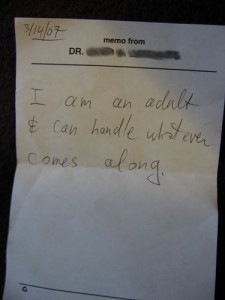 Starting pretty early on in my 13 years of Jewish Day School education, I had to take Bible quizzes where I confronted the question, “Mi amar l’mi?” which translates roughly to, “Who said what to whom?” So, like, if the quote was, “Lech l’cha m’artzecha …” (Or, more recognizably, in English, Go forth from your native land and from your father’s house to the land that I will show you) the answer would be, “God to Abraham.”
Starting pretty early on in my 13 years of Jewish Day School education, I had to take Bible quizzes where I confronted the question, “Mi amar l’mi?” which translates roughly to, “Who said what to whom?” So, like, if the quote was, “Lech l’cha m’artzecha …” (Or, more recognizably, in English, Go forth from your native land and from your father’s house to the land that I will show you) the answer would be, “God to Abraham.”
Most characters in the Bible sound alike, the way main characters in Woody Allen movies do*, so the test was more about remembering context than about identifying, say, our matriarch Rebecca by her sophisticated use of metaphor.
I think about this old memory test sometimes when I come across great quotes out in the wide world of the Internets. And so I present to you a pop cultural and political version of the old JDS standby: Who Said What to Whom? Except in this case, I think it’s more fun to answer, Who Said What ABOUT Whom? Bonus points for being able to identify the medium from which the quote comes.
No penalty for guessing; you can’t be more wrong than most of the people either being quoted or being spoken about. But no cheating. God, and my aged 2nd grade Hebrew teacher, is watching.
#1) “He was a one-man-band who rarely took advice.”
#2) “Ryan Gosling didn’t get an Academy nomination? There’s some bullshit right there.”
#3) “His actions have made it look like people in Texas are absolute fools. I always thought he was foolish and then the more he talked, the more doubt he removed.”
#4) “By the end of my second term we will have the first permanent base on the moon and it will be American.”
#5) “Crying is one of the great pleasures of moviegoing, but tears can be cheap. … And, yes, you may cry, but when tears are milked as they are here, the truer response should be rage.”
*Which could give you a hint, if you were inclined to take it, about the collator or creator of these stories, but that’s beside the point.
 – Paul
– Paul





 Me in an alphabetical nutshell, according to my browser:
Me in an alphabetical nutshell, according to my browser: I have never been one for vampires.
I have never been one for vampires.